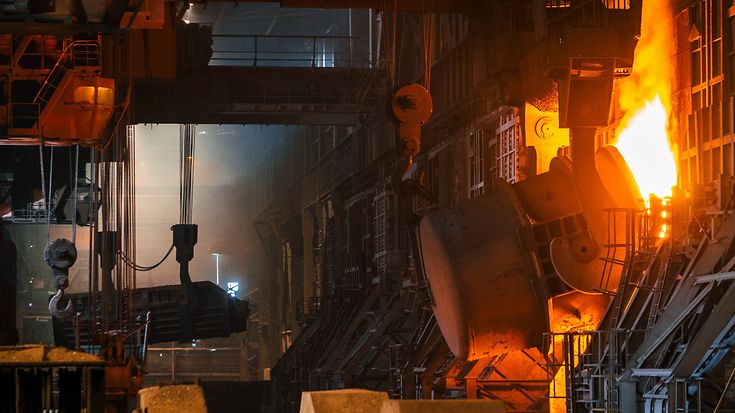What a natural gas supply freeze would mean for the economy and the insurance industry
Europe faces the difficult task of possibly having to ration natural gas. This could lead to business interruptions in the industry. However, there is no insurance coverage for this case.

Heavy industry is one of the largest consumers of natural gas.
When push comes to shove, Europe faces a distribution battle for natural gas this winter. In the context of the war in Ukraine and the subsequent sanctions imposed by the West, Russia's President Vladimir Putin is using natural gas supplies to build up counterpressure. The EU is bracing for a possible supply freeze and has presented a contingency plan : It calls on member countries to save energy - if necessary with coercive measures.
The EU countries, including Germany, are also preparing for an emergency. The Federal Ministry of Economics and Technology had already declared the first stage of the natural gas contingency plan at the end of March, followed by stage two in June. It will be take effect when there is a gas supply disruption or exceptionally high demand for natural gas that results in a "significant deterioration of the gas supply situation". However, the market is still able to cope with the disruption without the need for government intervention.
State can ration natural gas
This changes with the proclamation of the third and final stage: the emergency stage. The state then intervenes and imposes additional "non-market-based measures" to secure natural gas supplies in Germany as far as possible. This means: Natural gas will be rationed, and this basically affects everyone: municipalities, private households, housing associations and businesses. It is still unclear whether specific groups will be prioritised. However, the head of the Federal Network Agency, which has to enforce the measures, has already indicated that there could also be shutdowns in the industry.
Companies must prepare for this scenario and take precautions. Save energy and, if possible, switch to alternative energy sources. Otherwise, there is a risk of production losses: Assembly lines could come to a standstill, melting furnaces could cool down, chemical plants could fall silent; machines might neither punch nor roll. Even companies that do not need natural gas could be indirectly affected by production stoppages at suppliers.
Insurance benefits requires property damage
Such production losses are not insured. While business interruptions can be insured separately, compensation always presupposes property damage. This means: If production comes to a standstill due to a fire in a factory, any resulting damage will be covered by business interruption insurance. Production losses due to government-imposed and pre-planned rationing of raw materials, on the other hand, are not.
This reading is confirmed by a recent expert report commissioned by GDV. The experts conclude that when the emergency stage is declared, it is a "scheduled shutdown" and the corresponding risk exclusion in the model clauses applies. Even if the existence of property damage is not specifically agreed in a clause (which may be the case with older policies), the risk exclusion "scheduled shutdown" ultimately applies, according to the experts' assessment.
Fitch rating agency: Insurance sector not affected
In a recent analysis, the Fitch rating agency came to the same conclusion: Accordingly, the insurance sector would not be affected by business interruption losses resulting from a halt in Russian natural gas supplies to Europe. The so-called “business interruption policies” only cover losses caused by physical damage to business premises or production facilities. He also said the companies' chances of receiving claims under political risk insurance policies were slim.
For insurers, such exclusion clauses are important to protect themselves from many simultaneous claims that would overwhelm them. This is always the case with so-called “accumulation risks”. This refers to hazards that can cause a great deal of damage in a relatively short period of time, such as war, pandemic, or an interruption in electricity or natural gas supply planned months in advance. After all, if many companies make claims at the same time, the principle of risk diversification no longer works. Insurance is designed to cover unforeseeable random events.
Insurers could face indirect losses
Indirectly, however, insurers could feel the effects of a natural gas supply freeze, as the Fitch rating agency points out. Savings in heating energy, for example, could lead to more water pipes bursting in houses in winter, a classic case for building insurance. It is also conceivable that temporary production stoppages in plants will subsequently lead to more machine damage, for which the insurance industry will be liable.